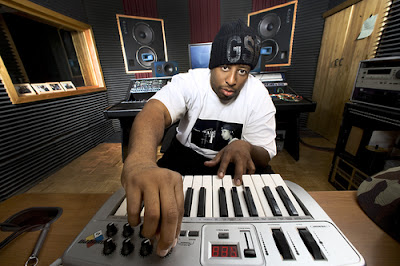Just about any genre of music has its share of producers who are as famous (or almost as famous) as the artists themselves. That is true in rock, country, jazz and R&B, and it is also true in rap. From Sylvia Robinson to Russell Simmons to Sean "Puffy" Combs, rap has had its share of famous producers over the years. This essay takes a look at some of hip-hop's most important studio wizards -- people who have been as important to hip-hop as Bob Ezrin and Jimmy Iovine are to rock, Orrin Keepnews is to jazz and Kenny Gamble & Leon Huff are to Philadelphia soul.
Showing posts with label Rap. Show all posts
Showing posts with label Rap. Show all posts
Sunday, February 20, 2011
Saturday, January 29, 2011
Gangsta Rap (Essay)
Ever since some gang-related violence occurred at a Run-D.M.C. concert in Long Beach, CA in 1986, rap music has been controversial; hip-hop had its detractors in the '80s and still has plenty of them in the 21st century. And no form of rap has been more controversial than gangsta rap, which has been attacked by everyone from Tipper Gore to conservative talk show host Bill O'Reilly. Why have so many people been critical of gangsta rap, including some of hip-hop's non-gangsta MCs? It all comes down to the first-person format; instead of rhyming in the third person about the problems of the inner city, gangsta rappers rhyme in the first person about the lives of thugs, felons, gang members, pimps and crack dealers. Gangsta rappers portray the thugs they're rapping about, which is a lot different from what Grandmaster Flash & the Furious Five (one of rap's earliest groups) did on their 1982 classic "The Message." That gem found Flash and his New York colleagues rapping in the third person about the oppressive conditions of the inner-city ghetto, but they didn't actually portray criminals -- gangsta rappers, however, give listeners the perspective of a gangbanger, a drug dealer or someone who is serving hard time for armed robbery. And for that reason, gangsta rap has often been accused of glorifying -- or even promoting -- crime and violence. But many gangsta rappers have countered that portrayal should not be confused with advocacy; in other words, the fact that Ice-T, Snoop Dogg and Dr. Dre have portrayed thugs on record doesn't mean that they're encouraging listeners to live the thug life. Ice-T would argue that when he gave first-person accounts of thug life on "6'N the Mornin'" and "Colors," it was comparable to Joe Pesci and Robert De Niro portraying hoodlums in Casino and Goodfellas -- that he wasn't promoting thuggery any more than director Martin Scorsese's modern film-noir.
Female Rap (Essay)
Historically, rap has been a very male-dominated idiom -- much more so than R&B, country or dance-pop. That is true in the United States; it is true in Europe and Latin America, where women don't play nearly as prominent a role in rap as they do in Latin pop (a field that has given us countless female superstars). Nonetheless, female rappers have made some important and valuable contributions to hip-hop, which would have been a lot poorer without Queen Latifah, Salt-N-Pepa, MC Lyte or, more recently, Eve. From rap's old school era (roughly 1976-1982, give or take a year) to the early 2000s, the same pattern has prevailed when it comes to gender: male rappers outnumber female rappers, but talented female rappers will inevitably break through commercially. Every hip-hop era has been male-dominated but has also had some important female rap stars -- and they range from Queen Latifah, MC Lyte and Salt-N-Pepa in the '80s to Foxy Brown, Nonchalant, Da Brat and Lil' Kim in the '90s and Eve in the early 2000s.
European Rap (Essay)
"Representing the 'hood" is a term that one frequently hears in hip-hop circles. Historically, rappers have been obsessed with telling you where they're from and why they're proud to be from a particular area. That's why Run-D.M.C. described themselves as "kings from Queens" (as in the Queens borough of New York City), and it's why N.W.A called their second album, Straight Outta Compton (as in Compton, CA, the tough Los Angeles ghetto that N.W.A was from). It's also why hip-hoppers from Long Island, NY affectionately call that area "Strong Island" and why many southern MCs refer to their region as the Dirty South (not dirty as in physically unclean -- dirty as in having explicit lyrics). From Master P in New Orleans to the Roots in Philadelphia, rappers all over the United States have been representing the 'hood and doing so in a very loud, vocal way -- they want to make sure that listeners know exactly where they're from.
Electro (Essay)
Before the rise of gangsta rap in the late '80s -- before N.W.A, Ice-T, Ice Cube and the late Eazy-E became international stars -- many Los Angeles rappers were known for a very different type of sound. Some have called that sound electro-hop, which is certainly as good a term as any. Electro-hop (or simply electro) was rap, but it wasn't hardcore rap and didn't appeal to rap purists any more than Shania Twain or Faith Hill appeal to country purists. Electro-hop was electronic pop-rap for the dance floor, and even though rap purists were vehemently critical of it (especially on the East Coast), the high-tech style did enjoy a small cult following on the West Coast in the '80s.














